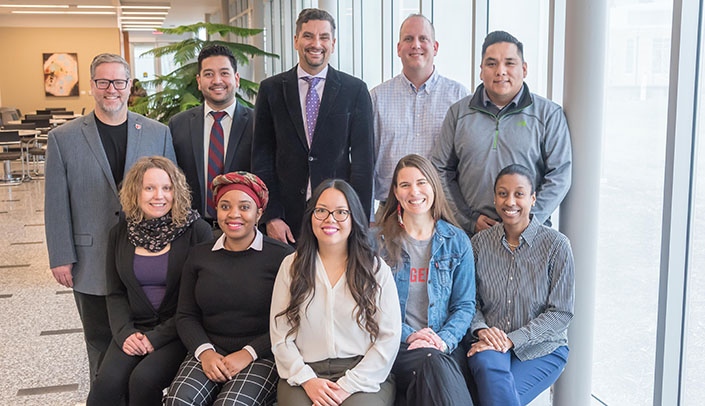The UNMC community is invited to attend a forum at 11 a.m. today to discuss a College of Public Health study looking into what Nebraska needs to do to address its lack of diversity in the health professions. The forum will be held in Room 3013 of the Maurer Center for Public Health. The forum also can be viewed via this Zoom link.
Public health study members
A diverse group of faculty, staff and graduate students from the UNMC College of Public Health led the research study with ethnic groups represented including African American, Cherokee, and Mexican. A 17-member community advisory board also consulted on the study. The team included:
Faculty
Patrik Johansson, M.D.
Keyonna King, Dr.PH.
Armando De Alba, M.D.
Regina Robbins, Ph.D.
Ron Shope, Ph.D.
Dan Schober, Ph.D. (DePaul University — when he started on the project he was at UNMC and then moved to DePaul University)
Graduate students
Echohawk Lefthand
Tatiana Tchouankam
Sonja Tutsch
Staff
Melissa Leon, qualitative researcher
Elizabeth Lyden, MS biostatistician
Matt Anderson, database developer
Moderators for the forum will be Judith Sanford-Harris, Ph.D., former director of K-12 programs and educational outreach, Harvard Medical School Office for Diversity and Community Partnerships, and David Dzewaltowski, Ph.D., Endowed Community Chair and Professor in the UNMC College of Public Health Department of Health Promotion.
In spite of longstanding efforts to promote diversity in health professions, groups such as African Americans, Latinos, and Native Americans remain underrepresented among health professionals in Nebraska and nationwide, said Patrik Johansson, M.D., associate professor and director of the Rural Health Education Network in the College of Public Health.
“With Nebraska seeking to become the healthiest state in the nation, it is critical for our state to have a health professions workforce representative of the populations experiencing health disparities,” he said.
The College of Public Health research team completed focus groups with African American and Latino high school, undergraduate, and graduate students interested in health professions, as well as with African American health professionals. The next step, Dr. Johansson said is to conduct focus groups with Native American students interested in health professions. Six different Midwest academic institutions are taking part in the study, which is supported by the Rural Futures Institute, the Center for Reducing Health Disparities, and the UNMC College of Public Health Dean’s Office.
Key study findings suggest that African Americans and Latinos face very similar barriers to pursuing health professions careers, including: lack of academic preparation; cost of education; lack of support; narrow knowledge of different health professions and how to pursue health professions careers; isolation; and perceived discrimination.
Preliminary recommendations from the research study were presented at the Nebraska Department of Health and Human Services Conference in York, Neb., on April 17. Among the recommendations were:
- Developing interventions that engage parents/guardians using culturally and linguistically appropriate strategies to promote health professions careers at high school, undergraduate, and graduate school levels;
- Having rural and underrepresented/urban-serving pipeline programs report to the same person to ensure consistent tracking and evaluation of both programs;
- Implementing targeted recruitment and holistic admissions policies;
- Addressing the lack of preparation through intensive training opportunities for students (supplemental instruction, academic enrichment programs, transition programs such as summer bridge programs);
- Providing financial support (scholarships); and
- Creating social supports at high school, undergraduate, and health professions school, including the creation of inclusive and safe spaces at all levels.
Dr. Johansson cited the changing demographics of Nebraska as a key reason the state needs to address its shortage of underrepresented health professionals. Given current population trends, he noted that in some rural areas of the state Latinos may represent the majority in the next 30 years, and Latinos only represent 1.6% of the rural primary care workforce.
Other key workforce findings of the UNMC Health Professions Tracking Service include:
- African Americans represent 5.1% of the state’s population but only 1.3% of the primary care workforce; and
- Native Americans represent 1.5% of the state’s population but only 0.3% of the primary care workforce.
Dr. Johansson said results from the study will be utilized by the college to address diversity in the state’s changing demographics and to shape its key initiative – UNMC Rural Health 2030: 2018-2019 Rural Action Plan. Complete details on this initiative are available here.
